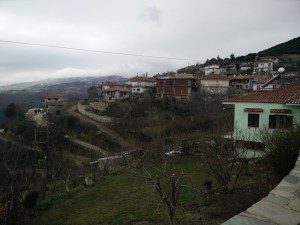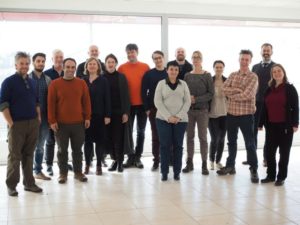This year our friends Anton & Karsten from the Goto10 collective visited the 30th CCC congress.

Five lectures I made a note of:
1) Internet Lanscapes
In Internet Landscapes, Evan Roth with discuss his work as it relates to visualizing, archiving and understanding the Internet and its effects on culture with a focus on the misuse of communication technologies. Roth will trace his personal and creative history within an Internet landscape that has changed significantly in the last 16 years. The presentation will include a range of work culminating in his more recent pilgrimages to the beaches of the UK, New Zealand and Sweden, where submarine Internet fiber optic cables reach the land. Armed with an array of paranormal technologies, Roth will recount his personal quest to visualize and reconnect with a changing Internet landscape.
2) Datahavens
Datahavens have long been discussed as a solution to user security and privacy needs. Instinctively, the idea of physical locations where servers for communications, financial privacy, and other services can work is easily understood and seems appealing. As a founder of the HavenCo datahaven on Sealand in 2000, I saw firsthand the potential and the pitfalls of this approach.
Datahavens have long been discussed as a solution to user security and privacy needs. Instinctively, the idea of physical locations where servers for communications, financial privacy, and other services can work is easily understood and seems appealing. As a founder of the HavenCo datahaven on Sealand in 2000, I saw firsthand the potential and the pitfalls of this approach.
We will discuss the concept behind datahavens, some specific examples, the legal and technical challenges they face, and how specifically HavenCo failed. While projects to date have largely failed, there is hope for the future, both in the physical datahaven approach and in technical measures, so there is good reason to be optimistic.
3) Netzpolitik in der Schweiz
2015 und 2016 sind wichtige Jahre für die Netzpolitik in der Schweiz, denn die Parlamente entscheiden sowohl die Revision des BÜPF (Bundesgesetz betreffend die Überwachung des Post- und Fernmeldeverkehrs) als auch das NDG (Nachrichtendienstgesetz).
Die beiden Gesetze würden den entsprechenden Bundesbehörden deutlich mehr Handlungsfreiheiten einräumen, wenn es um das Sammeln von Daten auf Vorrat und das Überwachen der Telekommunikation geht. Im Vortrag geben wir eine Übersicht über die beiden Gesetze und sprechen darüber, welche Auswirkungen sie unserer Meinung nach haben werden und was wir dagegen unternehmen und bereits unternommen haben.
Einige der am stärksten kritisierten Punkte der Gesetze sind:
-
- Dem Nachrichtendienst wird der Einsatz von Staatstrojanern gestattet,
-
- Dem Nachrichtendienst wird exzessiver Zugriff auf den Internetverkehr in der Schweiz gestattet (Kabelaufklärung),
-
- Die Vorratsdatenspeicherung in der Schweiz wird weiter ausgebaut.
Wir gehören zum CCC-CH und zur Digitalen Gesellschaft (Schweiz). In der Schweiz haben die Stimmberechtigten die Möglichkeit, das Referendum zu ergreifen. Gelingt es, innerhalb von einhundert Tagen nach in Kraft treten der Referendumsfrist 50’000 Unterschriften zu sammeln, so kommt der Gesetzesentwurf vor das Stimmvolk, welches das letzte Wort hat. Doch 50’000 Unterschriften wollen erst mal gesammelt werden… Leider werden die Gesetze zeitlich versetzt verabschiedet, so dass die Referendumsfristen nicht, wie ursprünglich erhofft, zusammenfallen. Es ist durchaus denkbar, dass es sich dabei um ein politisches Manöver handelt, da das BÜPF doch deutlich mehr Gegner hat als das NDG.
Im Falle des NDG hat die Digitale Gesellschaft, zusammen mit der Piratenpartei Schweiz, grundrechte.ch und dem CCC-CH, unter nachrichtendienstgesetz.ch eine Plattform erstellt, um die Unterschriftensammlung zu koordinieren. Zum Zeitpunkt des 32C3 wird die Referendumsfrist wohl schon beinahe vorbei sein. Wir berichten, wie das Unterschriftensammeln verlaufen ist, was das jetzt zur Folge hat und was wir daraus lernen können – auch in Hinsicht auf das BÜPF, dessen Referendumsfrist wohl kurz nach dem 32c3 beginnen wird. Glücklicherweise hat das BÜPF deutlich mehr Gegner als das NDG, weshalb sich die Initianten von stopbuepf.ch gute Chancen erhoffen.
Im Anschluss an den Talk gibt es eine ausgedehnte Diskussions- und Fragesession zu den behandelten Themen im Raum A.2: Siehe hier
4) Totalitarianism & Cyberspace
n my talk I am 1) discussing philosophical concepts of privacy, especially Hannah Arendt’s philosophy. I am 2) explaining why in a liberal-democratic system we need to protect our privacy and 3) what we can morally do to prevent catastrophes such as a totalitarian system from happening again. With Hannah Arendt’s arguments and her analysis of totalitarian systems in mind, I am referring to three examples from today’s privacy discussions: cybermobbing, Behavioral Advertising and secret services.
5) The State of Internet Censorship
The techniques to control access to the Internet, and the ability to bring transparency to those processes are both continuing to evolve. We’ll give an update on the landscape of online information controls, and our ability to measure them.
The talk will give an update on current country-level practices, the techniques in use to measure them, and an overview of major tools in use.
Over the past couple years, restrictions on Internet access have grown even more ubiquitous. Many take the form of URL or Domain blacklists implemented by western countries, along with increased levels of self censorship on social platforms with user generated content.
The measurement community continues to play a catch-up game. Through a mixture of watching legislature, an increased understanding of what we need to build to keep track of internet controls, and discoveries of side channels that let us externally measure connectivity, we’re making progress!
 .
. Their Nitos lab offers a grand facility for prototyping and testing a wide range of sensor components, wireless options and engineering of suitable interfaces we will need for the successful establishment of the MAZI toolkit at the pilot sites in Berlin, Deptford, Zurich and in the wild from Athens to Edinburgh.
Their Nitos lab offers a grand facility for prototyping and testing a wide range of sensor components, wireless options and engineering of suitable interfaces we will need for the successful establishment of the MAZI toolkit at the pilot sites in Berlin, Deptford, Zurich and in the wild from Athens to Edinburgh. Those left standing continued on to a trip up the Olympian mountains in central Greece, a unique opportunity to visit community wireless project Sarantaporo.gr. We met it’s key protagonists and heard first hand, from locals about their hopes and fears for the future. Improvements in the interlinking of settlements has already animated relations and revealed more ancient rivalries of village life. The children and more specifically grandchildren of longest lived residents are the most enthusiastic adopters of the new services in place, now much more willing to visit from nearby towns and cities than ever. Further promotion of mountain existence and wider expansion of the impressively well distributed quality broadband is underway. . Quality broadband access has been granted by regional university in Larissa and the project has already delivered to eleven of the many dislocated villages. Population depletion of recent decades now shows strong signs of reversal as a consequence of economic turmoil and these homegrown successes. The sense of goodwill and courage demonstrated was an inspiration and energis for the MAZI we now embark on together.
Those left standing continued on to a trip up the Olympian mountains in central Greece, a unique opportunity to visit community wireless project Sarantaporo.gr. We met it’s key protagonists and heard first hand, from locals about their hopes and fears for the future. Improvements in the interlinking of settlements has already animated relations and revealed more ancient rivalries of village life. The children and more specifically grandchildren of longest lived residents are the most enthusiastic adopters of the new services in place, now much more willing to visit from nearby towns and cities than ever. Further promotion of mountain existence and wider expansion of the impressively well distributed quality broadband is underway. . Quality broadband access has been granted by regional university in Larissa and the project has already delivered to eleven of the many dislocated villages. Population depletion of recent decades now shows strong signs of reversal as a consequence of economic turmoil and these homegrown successes. The sense of goodwill and courage demonstrated was an inspiration and energis for the MAZI we now embark on together.

